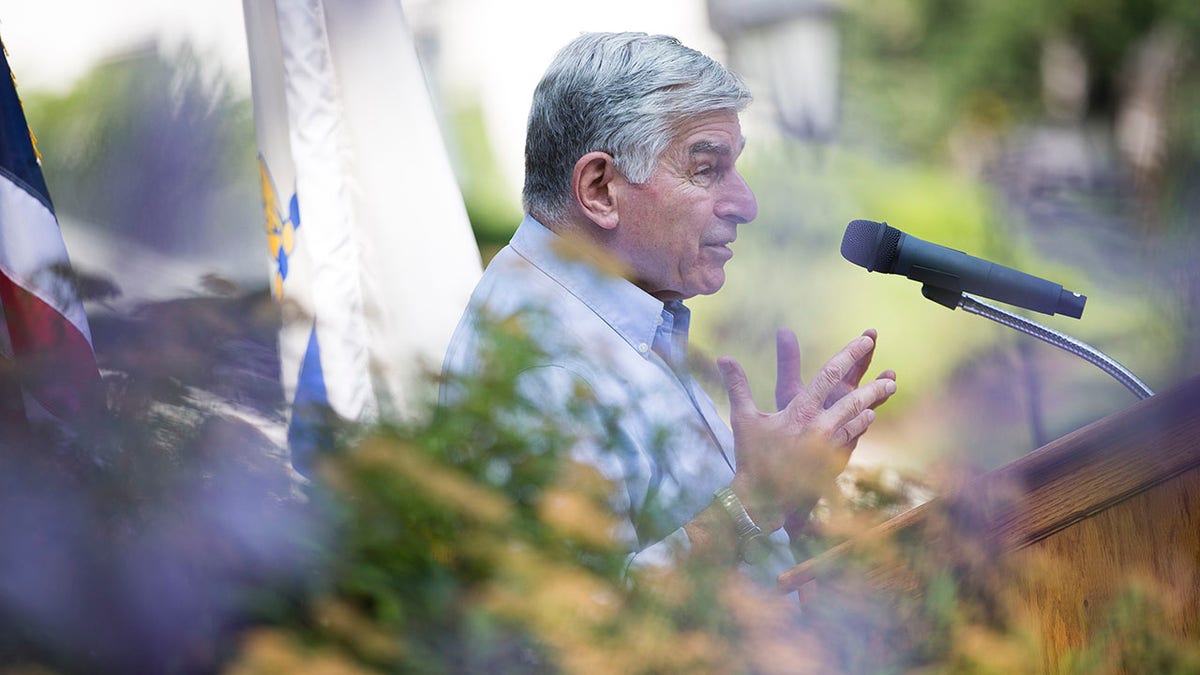Former Massachusetts Gov. Michael Dukakis says defunding police ‘makes no sense at all’
Dukakis argues the key to drive down crime rates is building a relationship between the police and the communities they serve.
Former Massachusetts Gov. Mike Dukakis argues that Democrats ever embracing defunding police "makes no sense at all," saying other Democratic-run cities must follow Boston’s lead in bolstering the relationship between police officers and the communities they serve in order to drive down crime rates.
The longest-serving governor in Massachusetts’ history, Dukakis said Massachusetts, a state with one of the lowest murder per capita rates in the nation, shows how Democrats have gotten it right in the past when it comes to "community policing," which involves having officers patrol different neighborhoods in order to build relationships and establish a baseline of respect with members of the community.
That concept, however, has been threatened by progressives in the Democratic Party who have aligned themselves over the past year with the "defund the police" movement. As departments were scaled back, and crime rates soared in cities like New York and Chicago, community policing has taken a hit.
"Defunding the police doesn’t make any sense. Building an excellent police force that it committed to community policing does make sense," Dukakis told Fox News. "The more the merrier."
BIDEN SCORCHES ‘DEFUND POLICE’ MOVEMENT BY PUMPING FUNDS BACK TO NYC
"Look, there were some people who started talking about defunding the police. I called it nuts," he continued. "I thought it was a mistake. It doesn’t make any sense to me. Of course we need excellent policing. But it’s what kind of policing. How do you build that relationship with communities?"
Dukakis pointed to how community policing would "revolutionize police in the United States" during the 1990s, first when Boston Police Commissioner Bill Bratton successfully drove down crime, so much so that he was poached by New York City Mayor Rudy Giuliani to address record homicide levels. Bratton cut the number of homicides in half in New York City in just a two-year period, Dukakis said, before Giuliani fired him.
Bratton later became chief of police in Los Angeles, where he again applied the concepts of community policing by reaching out to American civil rights activist Connie Rice. Once a staunch critic of the LAPD, she grew to become one of Bratton’s bigger supporters, Dukakis said.

Former Massachusetts Gov. Michael Dukakis speaks at the State House in Boston on July 20, 2016. (Keith Bedford/The Boston Globe via Getty Images)
Speaking to The Washington Post last month, Bratton discussed how criminal justice reform has unfortunately contributed to rising crime in many cities, as some offenders who need to remain in jail have been let back onto the streets to commit additional violence. When asked about this issue by Fox News, Dukakis said, "There’s nothing wrong with looking at the criminal justice system to determine whether or not there are ways to improve it."
"But the idea that you can somehow walk away from community policing, if that’s what some of the advocates of defunding are talking about, makes no sense to me at all. Of course we need a police force," he said.
Despite some progressives pushing to defund, reimagine or abolish police in the year since George Floyd’s death in Minneapolis, Dukakis was firm in saying that’s not what true progressive stand for.
"I’m a very proud progressive, and I’m a strong believer in community policing," Dukakis added. "Most of the people who I know who call themselves genuine progressives understand the importance of community policing."
EVOLUTION OF THE ‘DEFUND THE POLICE’ MOVEMENT: HOW IT HAS CHANGED
Dukakis credited Bill Clinton as the first president to get serious about community policing on the federal level, but the Massachusetts Democrat still stressed mayors and local officials must be the first to take on the responsibility of effectuating good policing.
It's the ingrained culture of community policing, and the fact that Northeastern University in Boston was one of the first colleges to offer degree programs for police, is what’s driven Massachusetts to have one of the lowest homicide rates in America, Dukakis said.
As per the latest comprehensive statewide data published by the FBI, the murder rate per 100,000 inhabitants in Massachusetts was 2.2 in 2019. Just Maine, Vermont, Iowa, South Dakota, Idaho, Minnesota, Utah and Wyoming had that rate or lower. The data for 2020 will be released this September.
"My capital city actually reduced the level of violence. Not that we’re violence free, don’t get me wrong," Dukakis said, as homicides in Boston so far this year have declined by 29% compared to the same time period last year. "I think it is significant that Boston happens to be not only in a state of the least violence in the country, but seems to be coping pretty well with the pressures of the pandemic."
Boston has witnessed at least 20 homicides so far this year through July 18. It’s driven down homicides since 2020, when homicides unusually spiked by 54% compared to 2019. That compares to New York City, which has seen 233 murders so far this year through July 18. Homicides there have increased by 3% compared to the same time period last year. In 2020, murders in New York City were up 47% compared to 2019.
CLICK HERE TO GET THE FOX NEWS APP
The need for more, better policing seems to be hitting home in the Democratic Party at the federal level, as President Biden seemingly scorched defund the police’s efforts last week in announcing he was making $350 billion from the American Rescue Plan available to police departments across the country to in part hire more officers and fund overtime payments to get more police onto city streets.
That followed the Department of Justice also sending out strike forces to combat gun trafficking.
"The day-to-day, week-to-week ongoing relationship with the community is critical," Dukakis said. "It’s not just snapping your fingers and saying well we’re going to do a mental health program."











































